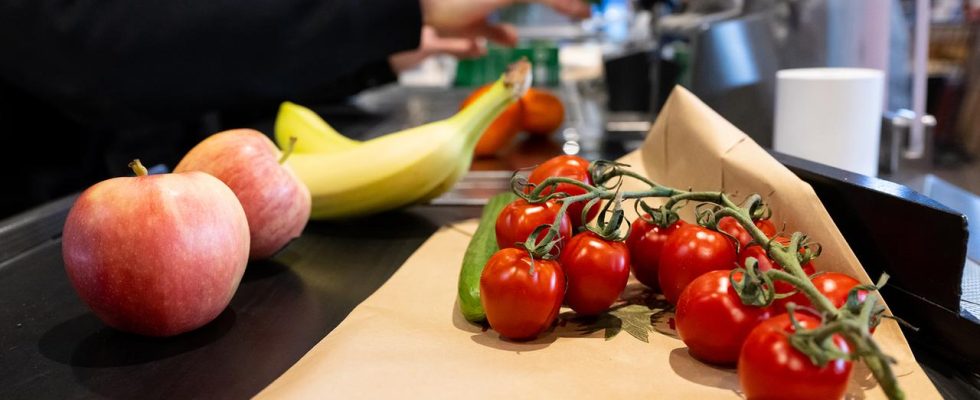background
The reason inflation is so high is largely due to the rise in food prices. However, if one paid more attention to fairness and the environment, food would actually have to cost significantly more.
Dairy farmer Matthias Pitzer does not have many cows. On his farm in Bad Endbach, Hesse, there are 50 dairy cows and a handful of beef cattle. He produces his milk according to organic standards. There is fresh grass from the pasture to eat, the cows have comparatively much space to live. But that doesn’t do him much good in the price war over milk prices: “The price pressure is immense. Everything is getting more expensive for us. And on the other hand, consumers are trying to save.”
“Prices are completely non-transparent”
After all: Pitzer is part of the initiative “You are the boss here”. He is one of those farmers where a group of consumers determines how much the farmer earns and what the milk should cost in retail. The farmer doesn’t usually know this in advance, says the head of the initiative, Nicolas Barthelmé. As a rule, it is the dairies and retailers who set the price: “The prices are completely non-transparent for consumers. They don’t know where the money goes. That’s a problem.”
In the case of the milk from “You are the boss here”, the initiative decided that the liter should cost 1.59 euros. The farmer should remain 0.63 euros. On average it is 0.50 euros. The problem here isn’t the consumer, but the retail trade, says Barthelmé: “Billions in sales are made in the food trade. The money is just misallocated.” In addition: animal and nature conservation does not come for free. Farmers are not getting enough at the moment.
consequential costs for society
However, according to scientists at the University of Greifswald, just paying farmers fairly would by no means lead to the prices that would actually have to be paid in the shop. Environmental economist Amelie Mischalke researches the so-called “true cost” for food. These “true prices” are the costs for a product “that arise externally but are paid for by our society”.
To put it simply: When consumers pay for things like apples or clothes, there are other “real costs” behind the actual costs that we as a society share. This includes, for example, consequential damage to our environment or as a result of climate change, if high emissions occur in the production of food or groundwater is polluted. Health costs are also taken into account, for example as a result of poor working conditions – or the effects of food on human health.
Especially meat would be much more expensive
The researchers at the University of Greifswald do the math: If, for example, you included all of the above-mentioned factors in the case of minced meat, which currently costs an average of eight euros per kilo in discounters, the true costs would be almost 175 percent higher – minced meat would then not be eight euros , but cost just under 22 euros per kilogram. With milk, at the current average price of 1.15 euros, a surcharge of 112 percent would be necessary – that would result in a liter price of 2.44 euros. For a kilo of apples – current price 1.96 euros – the “true cost” surcharge would still be comparatively low at eight percent, but would also lead to a price of 2.12 euros.
Applying such a concept is not easy. However, the idea is that the costs are primarily incurred by those who cause them, within the supply chain. An environmentally harmful fertilizer, for example, would become more expensive and, ultimately, so would the product. “The idea is that supply and demand will ultimately change over the long term.”
What about people in social need?
This is where the criticism begins: What about those who are already finding it difficult to afford groceries? “I think it’s absolutely questionable to play off social hardship against an ecological and sustainable way of life,” says Yasmin Alinaghi, state director of the Hesse Parity Welfare Association. The problem is not that the prices should be higher, but that the rates – such as citizen income – are too low for precarious people.
It is still too early to think about implementing the “True Cost” concept. At the moment it is more about getting the discourse going, says environmental economist Amelie Mischalke. Implementation would have to be preceded by a major political process. In Germany alone, the concept would be difficult to implement without international cooperation because of the dependence on global trade. Nevertheless: “The pricing makes it clear what is going wrong in our food production,” says Mischalke.
Everyone lends a hand on the farm
Dairy farmer Matthias Pitzer would probably agree. Currently he has hardly any problems with the production of his milk. He can keep his production costs low because the whole family pitches in. Holidays often fall by the wayside, he says. However, he also sees that things can be more difficult elsewhere. The higher prices for his milk mean he can invest in animal welfare.
In the end, he has one simple question: “Do you want to farm for nature and the farms, or do you just want to produce large quantities?”

